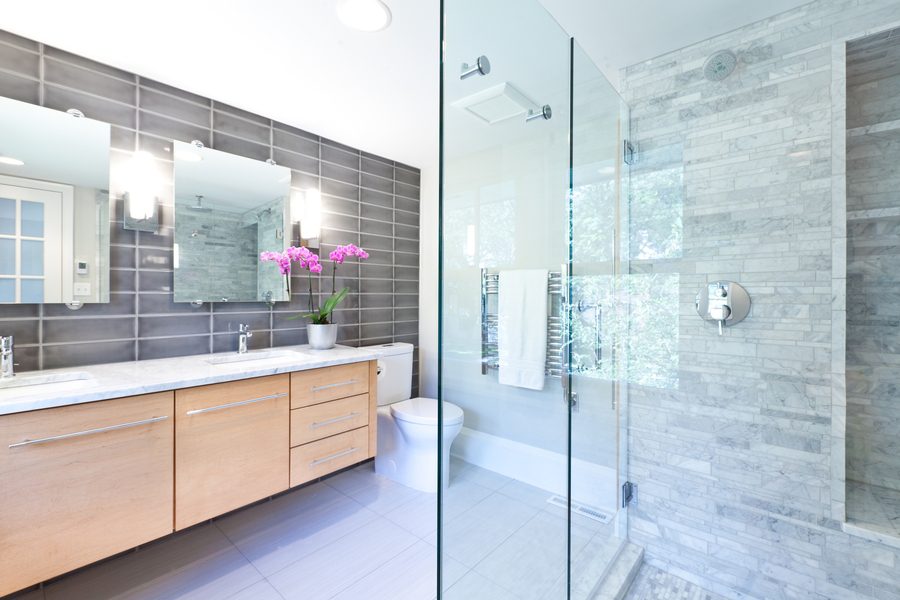How much thought have you put into your bathroom mirror? Mirrors serve critical functional and aesthetic purposes in the bathroom, yet they are too often an afterthought of homeowners. What mirror size, shape and mounting option works best in a bath? That question is easier asked than answered, because the size, shape and type of mirror are influenced heavily by the design, dimension and configuration of the space and other components in the bath.
Mirror size should be proportional to the size of the vanity. A general rule is that the mirror should not be wider than the vanity, and in some cases, the mirror should be the same width as the vanity. If you are installing sconces on the sides of the mirror, you will want the mirror to be significantly narrower than the vanity. If your vanity is a standard size, it’s easier to match mirror size to vanity dimensions. If your bath requires a nonstandard size vanity, you may want to choose a mirror that is intentionally a bit narrower than your vanity.
As to height, the taller, the better! A taller mirror not only makes the bath appear larger; it also provides multiple viewing angles. Another general rule of thumb is to specify mirrors that sit at least four feet above the floor. Keep in mind the user’s height when selecting the height of your mirror. There is nothing worse than not being able to see yourself in a bathroom mirror because it is mounted for someone who is 6′ tall and you’re 5’2″.
The number and type of mirrors depends upon how you would like the bath to look and feel. Vanities that run the length of the wall and feature double sinks can easily accommodate a wall-length mirror that will make the space appear larger. These large mirrors can even be framed to add some more style to the space. Another popular option for homeowners in is to hang individual mirrors over each sink.
Lighting also plays a role in determining the size and number of your bathroom mirrors. Try to avoid the common practice of placing a light rail above the mirror; this creates shadows that make grooming and applying makeup more difficult. Space permitting, we often recommend sconces on each side of the mirror to provide both task and ambient light. If there is not sufficient space or the style, look and feel of the space is not sconce friendly, consider mirrors with integrated lighting.
Round, square, rectangular, hexagonal – the options are limitless and picking the shape perfect for a bath renovation depends on style, design and personal preference. Round and oval-shaped mirrors tend to soften a space and are a popular choice in baths featuring pedestal sinks because the curves of the mirror complement the curves found in many pedestals. A design feature of round and oval-shaped mirrors is that they expose more of a wall and can serve to better highlight design features such as an accent wall or statement-making wallpaper.
Most mirrors that we specify for our clients are framed. The type of frame and detail is based on the look and style of the bath. More ornate frames work well in traditional décor. Often, our clients prefer frames that do not compete with other design elements in the bath.
Frameless mirrors are better suited to contemporary motifs, offering clean lines and a minimalist feel, and are mostly used when the mirror extends the full length of the wall.
Short on storage? Consider a mirrored cabinet, also referred to as a medicine cabinet. These are often the preferred and best solution for homeowners with smaller baths because of their dual purpose of serving as a mirror and providing storage space.
Mirror options present a unique opportunity to make a distinct and personal design statement while simultaneously providing the needed functionality. What size, shape and style would work best in your bath? Please give us a call at (insert phone number) or visit our showroom at (insert address) to discuss the possibilities.

